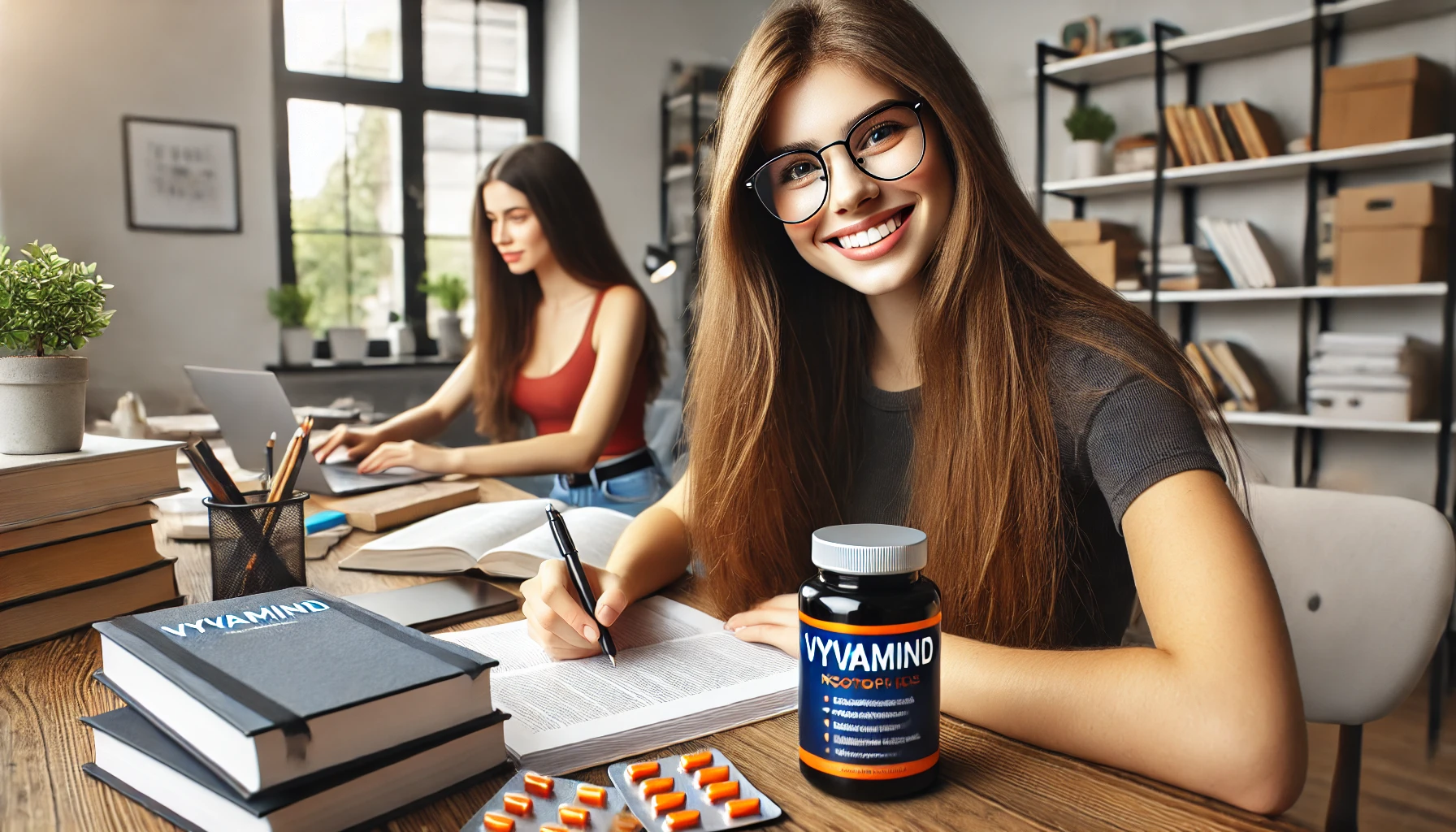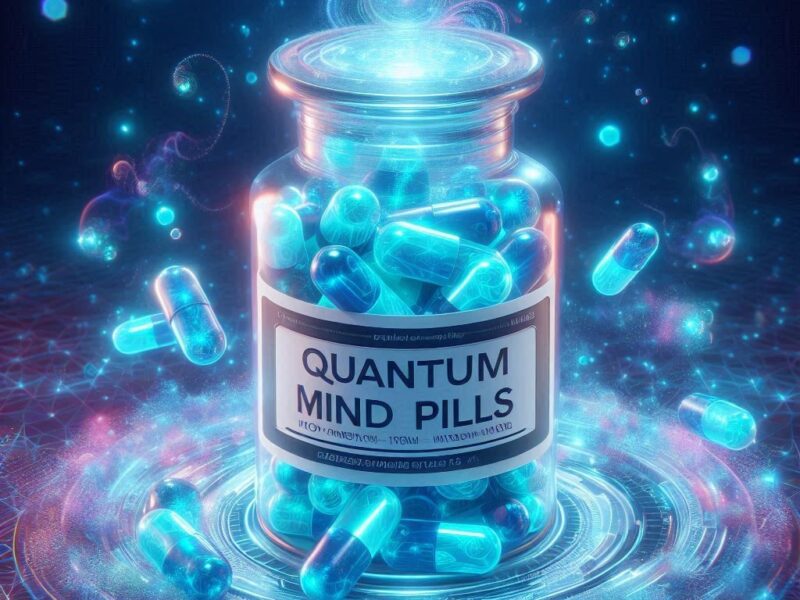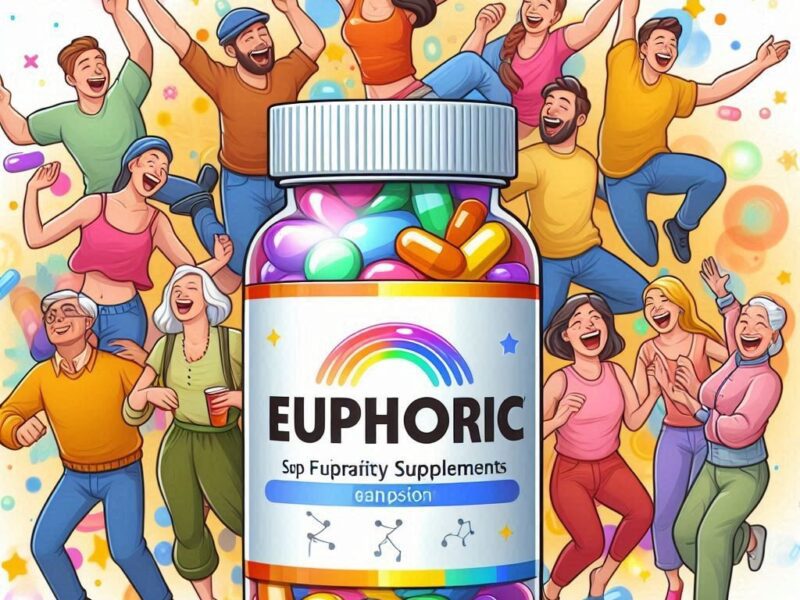Overview of Vyvamind: Introduction
Popular nootropic supplement Vyvamind is meant to improve cognitive ability including mental clarity, memory, and focus. Designed for professionals, students, and anybody looking for a mental edge, Vyvamind blends naturally occurring elements recognized for their cognitive advantages. Among the main ingredients are L-theanine, L-tyrosine, citicoline, caffeine, and vitamins B6 and B12. These components cooperate to give a steady and balanced increase in mental performance free from the jitters or crashes sometimes linked with stimulants.
Nootropics: Their Increasing Popularity
Nootropics have attracted a lot of interest recently since more people are looking for solutions to raise their cognitive capacity. Vyvamind’s formulation and the repute of its components have helped it to become rather competitive in this industry. Those in high demand workplaces turn to it first since users claim enhancements in focus, productivity, and general mental vitality.
Examining Existing Reviews
Several studies on Vyvamind stress its safety profile and efficacy. Thanks to a mix of caffeine and L-theanine, users value the reasonable energy boost it offers. various evaluations, meanwhile, note that the dosage of various components might be less than what is used in clinical research. Vyvamind’s low levels of citicoline and L-tyrosine, for example, raise doubts over its general efficacy as the amounts usually deemed useful in studies are higher.
Addressing Content Gaps
Though the reviews have nice comments, there are clear content holes in the current ones. Many neglect the long-term consequences of continued usage, the lack of thorough clinical studies on the whole formulation, and the openness on inactive components. Furthermore, a more thorough comparison of Vyvamind with other nootropics will enable users to make more informed judgments.
Filling the Gaps
I will attempt to give a complete study of Vyvamind, filling in these voids and presenting a more whole picture. We want to produce material that not only covers the key points of Vyvamind but also offers useful, extra information lacking in existing reviews by including up-to-date knowledge and original thoughts.
All things considered, Vyvamind is a good nootropic pill with a well-balanced component profile meant to increase cognitive capacities. Still, there is space for a more thorough investigation of its long-term effectiveness and a better comparison with other goods on the market. This paper will explore these facets and give readers a thorough and instructive summary of Vyvamind.

Components and Their advantages
Caffeine
Well-known stimulant caffeine increases alertness and lessens tiredness. Vyvamind incorporates caffeine to improve cognitive ability. Studies reveal that caffeine sharpens overall cognitive ability, memory, and attention. Coffee keeps you awake and alert by activating the central nervous system, therefore facilitating task concentration.
l-theanine
One amino acid present in tea leaves, l-theanine, helps one relax without causing sleepiness. Along with caffeine in Vyvamind, it produces a balanced energy boost. While lowering the jitters is sometimes brought on by caffeine alone, l-theanine increases focus and attentiveness. Research indicates that this mix improves cognitive ability by offering a calm but aware mood.
L-Tyrosine
Production of neurotransmitter including dopamine, norepinephrine, and adrenaline depends on l-tyrosine. These substances control reactions to stress and mood. Especially in trying circumstances, Vyvamind uses L-tyrosine to increase cognitive flexibility and attention. Studies reveal that L-tyrosine improves mental performance under stress, therefore enabling improved focus and memory.
Citicoline
One powerful nootropic supporting brain health is citicoline. It improves phosphatidylcholine synthesis, a fundamental component of brain cell membranes. Vyvamind’s citicoline helps with memory, learning, and attention among other cognitive tasks. Scientific research indicates that citicoline protects against cognitive decline, boosts mental function, and raises brain energy.
Vitamin B6
Development and operations of the brain depend on vitamin B6. It helps create neurotransmitters, which are vital for brain cell communication. Vitamin B6 is included in Vyvamind to assist brain clarity and cognitive ability. Studies reveal that enough amounts of vitamin B6 help to lower depressive symptoms and enhance mood, thus promoting general cognitive health.
Vitamin B12
Red blood cells and the neurological system depend on vitamin B12. Vitamin B12 in Vyvamind fights tiredness and improves mood and memory. Research shows that vitamin B12 lowers cognitive risk, enhances mental clarity, and supports brain function. For elderly people especially, it helps to sustain cognitive ability and energy levels.
Synergistic Influences
Combining these components in Vyvamind produces a synergistic effect. L-theanine and caffeine cooperate to give a well-rounded increase in alertness and relaxation. L-tyrosine and citicoline increase the synthesis of neurotransmitters, therefore strengthening cognitive flexibility and attention. Vitamins B6 and B12 improve mood and mental clarity, therefore supporting general brain health.
Vyvamind’s components are selected for their shown advantages in improving cognitive ability. Every element adds specifically to brain function, and taken together they give a strong increase in mental performance. Those looking for a consistent cognitive booster often choose Vyvamind because of its balanced composition.
Clinical Trials and Efficacy
Examination of Existing Clinical Trials on Individual Ingredients
Strong proof for the cognitive advantages of the individual components in Vyvamind comes from thorough study of them in clinical trials.
L-theanine and Caffeine
The well studied nootropics are L-theanine and caffeine. Studies have found that caffeine improves memory, attention, and focus. By encouraging relaxation without lowering alertness, L-theanine helps offset the negative effects of caffeine, including jitters. Studies show that this combo enhances cognitive performance, especially for jobs needing constant attention and quick reaction times.
L-Tyrosine
L-tyrosine helps produce neurotransmitters linked to cognitive ability and stress response. Under stress in particular, L-tyrosine has been shown in clinical studies to increase cognitive flexibility and working memory. This makes it an important element for preserving cognitive ability under demanding conditions.
Citicoline
Crucially important for brain cell membranes, phosphatidylcholine is produced in greater abundance by citicoline. Citicoline enhances memory, learning, and general cognitive ability according to studies. Maintaining high degrees of mental performance depends on brain energy metabolism, hence it also promotes it.
Vitamins B6 and B12
For brain function, vitamins B6 and B12 are absolutely vital. While vitamin B12 is vital for preserving the neurological system and generating red blood cells, vitamin B6 helps produce neurotransmitters. While appropriate levels help to promote mood, memory, and cognitive ability, clinical investigations have shown that shortages in these vitamins can cause cognitive deterioration.
Call for Comprehensive Clinical Trials on the Full Vyvamind Formulation
Although the individual components in Vyvamind show promise, thorough clinical trials on the complete combination are still much needed. Such research would help to better grasp the interactions among these components and their combined effects on cognitive ability. Most research nowadays is based more on the individual advantages of every component than on the particular mix applied in Vyvamind.
Discussion on the Current Limitations of Efficacy Claims
Lack of Full-Formulation Studies
The lack of clinical studies on the whole product is one of the primary restrictions in the efficacy assertions for Vyvamind. Although individual components have study backing, without specific studies, the general efficacy of the particular blend of Vyvamind is still less known.
Dosage Discrepancies
The variation in dosages between those used in Vyvamind and those utilized in clinical studies adds to still another problem. Some studies, for example, employ more citicoline and L-tyrosine than those in Vyvamind. This disparity calls into doubt whether the lower doses are enough to produce the same cognitive advantages and influence the general effectiveness of the supplement.
Potential for Individual Variability
Individual variances in efficacy can be quite pronounced depending on age, health condition, and genetic variations. This diversity makes it difficult to project Vyvamind’s efficacy for any one consumer. Comprehensive clinical studies including several populations might help to overcome this restriction.
Although Vyvamind has components with shown cognitive advantages, the present restrictions emphasize the need of thorough clinical research on the complete formulation. By filling in these gaps, consumers would be better informed and more solid proof of its general effectiveness would be given.
Dosage and Use
Detailed Breakdown of Vyvamind’s Dosage for Each Ingredient
Several important components in Vyvamind have doses meant to improve cognitive performance. The breakdown is like this:
75 mg caffeine; 150 mg l-theanine; 300 mg l-tyrosine; 200 mg citrous; 2.5 mg vitamin B6; 50 mcg vitamin B12
Comparison with Clinically Effective Dosages
Caffeine and L-Theanine
Studies show that caffeine increases alertness and cognitive performance effectively between 40 and 200 mg dosages. Usually at a 2:1 ratio (L-theanine to caffeine), the combo seems to improve focus and lower jitteriness. Vyvamind is a balanced nootropic mix since his formulation runs in this ratio.
L-Tyrosine
Variations in L-tyrosine dosage—often 500–2000 mg—have been utilized in clinical research to demonstrate increases in stress response and cognitive flexibility. Although on the lower end, Vyvamind has 300 mg, which is still within a range that could be beneficial particularly in relation to other components.
Citicoline
In clinical studies, effective doses of citicoline vary from 250–2000 mg daily. Although Vyvamind has 200 mg, which is little below this threshold, when given regularly over time it still helps cognitively.
B6 and B12, respectively
In modest dosages, vitamin B6 and B12 are quite beneficial. Generally speaking, Vitamin B6 is taken at 1.5–2 mg and Vitamin B12 at 2.4 mcg for general health. Higher levels of these vitamins offered by Vyvamind can assist guarantee sufficient intake and maintain cognitive processes, especially in people with dietary deficits.
Recommendations for Optimal Usage
Dosage and Timing
One to two Vyvamind capsules a day is advised for best cognitive advantages. The optimal time to take Vyvamind is in the morning to coincide with natural energy cycles and prevent possible disturbances in sleep caused by the caffeine content.
Potential Stacking Strategies
Consider the following stacking techniques to maximize Vyvamind’s impacts:
Stack Vyvamind with nootropics like Rhodiola rosea or Bacopa monnieri to boost stress resilience and memory even more.
Either cycle between Vyvamind and other nootropic stacks weekly or use Vyvamind for five days on and two days off to avoid tolerance development.
Safety and Side Effects
Analysis of Potential Side Effects Based on User Reviews and Scientific Data
Natural elements found in Vyvamind are usually regarded as safe for most consumers. Still, possible adverse effects can happen, especially in sensitive people or those with particular medical disorders.
Common Side Effects
Users sensitive to caffeine may get jitteriness, sleeplessness, heart rate rise, or anxiety.
Some people claim nausea or stomach pain, most likely from caffeine or another active substance.
A few people report headaches, which could be brought on by interactions between substances or caffeine withdrawal.
Research evidence confirms these findings. In sensitive people especially when taken in large doses, caffeine is known to have adverse effects. Although typically safe, L-tyrosine and citicoline used in greater amounts can also induce moderate adverse effects including headaches and stomach trouble.
Importance of Transparency About Inactive Ingredients and Manufacturing Processes
Consumer confidence and safety depend on openness on production techniques and inactive components. Vyvamind does not yet specify its inactive components, which begs questions regarding possible allergies or fillers causing side effects.
Product safety also relies much on manufacturing techniques. Good Manufacturing Practices (GMP) are followed at the facilities producing Vyvamind, therefore guaranteeing consistency and quality. More thorough knowledge on these procedures, though, would comfort consumers on the integrity and safety of the product.
Tips for Minimizing Side Effects and Interactions with Medications
Gradual Introduction
Start at a lower dose to evaluate tolerance, especially if you are sensitive to caffeine or brand-new to nootropics.
Hydration and Nutrition
To assist in reducing possible gastrointestinal problems and headaches, stay well-hydrated and eat a balanced diet.
Avoid Late-Day Consumption
Take Vyvamind first thing in the morning to prevent caffeine-induced disturbances in sleep.
Consult a Healthcare Provider
See a healthcare provider before using Vyvamind if you use drugs or have underlying medical issues to help prevent any interactions.
Monitor and Adjust
Watch how your body reacts and modify the dosage in line with that. Should the side effects continue, stop using and consult a doctor.
Long-Term Effects and Tolerance
Discussion on Potential Long-Term Cognitive and Health Effects
Like several nootropic supplements, Vyvamind is meant for long-term cognitive improvement. Its components have specific advantages that help to maintain general brain function. But the lack of thorough clinical studies on Vyvamind’s overall formulation makes it difficult to properly understand its long-term effects.
Cognitive Benefits
Ingredients like citicoline and L-theanine are well-known for their neuroprotective qualities, which could support steady cognitive ability and mental clarity throughout time.
Regular citicoline and vitamin B12 consumption supports neuronal membrane integrity and general brain health, thereby helping to preserve and maybe enhance memory.
Implications for Health
Long-term use of components such as citicoline and L-tyrosine could offer neuroprotective effects, hence perhaps lowering the incidence of neurodegenerative illnesses.
L-tyrosine supports the synthesis of stress-related neurotransmitters, so helping to manage stress and increase resilience to stress over long terms.
Insights from User Testimonials on Tolerance Development and Cycling Strategies
User testimonies show different experiences with Vyvamind about tolerance building. While some users note a declining efficacy with time, implying the development of tolerance, others report constant advantages without any notable problems.
Tolerance Development
Individual Variability: Tolerance to Vyvamind might vary greatly amongst users. Reduced efficacy results from some users developing resistance to caffeine and other stimulants in the mix.
Symptoms of Tolerance: Common indicators of tolerance are lowered cognitive advantages and the need for bigger doses to have the same results.
Cycling Strategies
Regular Breaks: Users sometimes employ cycle techniques like taking Vyvamind for five days followed by a two-day rest to minimise tolerance. This prevents the body from adjusting to the components, so preserving the efficacy of the supplement.
Alternative Nootropics: Some consumers cycle Vyvamind with other nootropic pills to stop tolerance development. This approach guarantees a different consumption of cognitive enhancers, so preserving general cognitive performance without depending on one supplement.
Although Vyvamind shows encouraging long-term cognitive and health impacts, further thorough study is necessary to completely grasp. User quotes underline the need of controlling tolerance by means of cycling techniques and frequent rests. Following these guidelines helps users to maximise the advantages of Vyvamind and minimise the drawbacks.
Vyvamind vs. Other Nootropics
Comprehensive Comparison with a Range of Cognitive Enhancers
Vyvamind vs. Adderall
Adderall is a prescription medication commonly used to treat ADHD. It contains amphetamine salts, which are potent stimulants that increase dopamine and norepinephrine levels in the brain.
Pros of Adderall:
- Highly effective for ADHD symptoms.
- Strong cognitive enhancement, particularly in focus and attention.
Cons of Adderall:
- Potential for addiction and dependency.
- Significant side effects, including anxiety, insomnia, and cardiovascular issues.
- Requires a prescription and medical supervision.
Vyvamind, on the other hand, is a dietary supplement available over the counter. It uses natural ingredients like caffeine, L-theanine, L-tyrosine, and citicoline.
Pros of Vyvamind:
- Generally safer with fewer side effects.
- No prescription needed.
- Supports overall brain health with natural ingredients.
Cons of Vyvamind:
- Less potent than Adderall.
- Potential development of tolerance over time.
- Limited by lower dosages of some ingredients compared to clinical studies.
Vyvamind vs. NooCube
NooCube is a popular nootropic that combines various ingredients like Alpha GPC, Huperzine A, Bacopa Monnieri, and oat straw.
Pros of NooCube:
- Comprehensive blend of cognitive enhancers.
- Focuses on memory and learning improvements.
- Positive user reviews for cognitive enhancement and mental clarity.
Cons of NooCube:
- Higher cost compared to some other nootropics.
- Some ingredients may cause side effects like headaches or gastrointestinal issues.
- Requires consistent use over several weeks to notice benefits.
Vyvamind:
Pros of Vyvamind:
- Effective for immediate energy and focus.
- Well-balanced formula for cognitive support.
- Cheaper per serving compared to NooCube.
Cons of Vyvamind:
- Limited long-term studies on the full formulation.
- May need cycling to prevent tolerance.
- Less comprehensive blend compared to NooCube.
Vyvamind vs. Mind Vitality
Mind Vitality is another nootropic supplement that aims to improve focus, memory, and mental energy. It includes ingredients like Rhodiola Rosea, Panax Ginseng, and Gingko Biloba.
Pros of Mind Vitality:
- Includes adaptogens that help with stress resilience.
- Focuses on natural ingredients with a long history of use.
- Positive effects on mental clarity and stress management.
Cons of Mind Vitality:
- May take longer to see results compared to stimulant-based nootropics.
- Can be expensive depending on the retailer.
- Some users report mild side effects like stomach upset.
Vyvamind:
Pros of Vyvamind:
- Immediate cognitive benefits due to caffeine.
- Effective blend for focus and energy.
- Affordable and accessible without prescription.
Cons of Vyvamind:
- Short-term effects primarily due to caffeine.
- Needs careful management to avoid tolerance.
- May lack the holistic approach of Mind Vitality.
Pros and Cons of Vyvamind in Comparison to Competitors
Pros:
- Vyvamind offers a balanced formula with immediate and sustained cognitive benefits.
- It is generally safer with fewer side effects compared to prescription drugs like Adderall.
- More accessible as it does not require a prescription.
- Cost-effective compared to premium nootropic blends like NooCube.
Cons:
- May not be as potent as prescription medications for severe cognitive issues.
- Potential for tolerance requires cycling or breaks.
- The full formulation lacks comprehensive clinical trials to validate long-term efficacy.
- Limited transparency about inactive ingredients and detailed manufacturing processes.
Consumer Feedback and Real-World Performance
Summary of User Testimonials and Reviews
User feedback on Vyvamind is generally positive, with many users reporting significant improvements in focus, mental clarity, and overall cognitive performance.
Positive Experiences
- Enhanced Focus: Many users note a substantial increase in their ability to concentrate, particularly during long work hours or intense study sessions.
- Improved Mental Clarity: Users frequently report feeling more mentally sharp and clear-headed shortly after taking Vyvamind.
- Energy Boost: The combination of caffeine and L-theanine provides a noticeable energy boost without the usual jitteriness associated with caffeine alone.
Negative Experiences
- Mild Side Effects: Some users experience minor side effects such as headaches, nausea, or gastrointestinal discomfort. These are often mild and temporary.
- Tolerance Development: A few users report developing tolerance over time, requiring higher doses to achieve the same effects.
Case Studies of Various User Experiences in Different Professions and Lifestyles
Case Study 1: Technology Professional
Background: John, a software developer, often works long hours and needs sustained focus to manage complex coding tasks.
Experience with Vyvamind: John reports that Vyvamind significantly improved his ability to concentrate during extended coding sessions. The caffeine-L-theanine blend provided him with steady energy, helping him stay alert without feeling jittery.
Case Study 2: College Student
Background: Sarah, a college student, juggles a demanding course load and extracurricular activities.
Experience with Vyvamind: Sarah found Vyvamind particularly beneficial during exam periods. She noted enhanced focus and mental clarity, which helped her study more effectively and retain information better.
Case Study 3: Fitness Trainer
Background: Mike, a fitness trainer, requires high energy levels and mental sharpness to manage his classes and personal training sessions.
Experience with Vyvamind: Mike experienced a noticeable boost in energy and focus. He appreciated that Vyvamind helped him stay attentive and motivated during his fitness sessions without causing any noticeable crashes afterward.
Case Study 4: Creative Professional
Background: Lisa, a graphic designer, needs creativity and mental clarity to deliver high-quality designs under tight deadlines.
Experience with Vyvamind: Lisa reported improved mental clarity and creativity after taking Vyvamind. The supplement helped her brainstorm ideas more effectively and stay focused on detailed design work for extended periods.
Conclusion
Recap of Vyvamind’s Strengths and Areas Needing Improvement
Strengths:
- Balanced Formulation: Vyvamind combines caffeine, L-theanine, L-tyrosine, citicoline, and vitamins B6 and B12, offering a synergistic blend that enhances cognitive performance.
- Immediate Benefits: Users experience improved focus, mental clarity, and energy shortly after consumption.
- Safety Profile: The natural ingredients in Vyvamind have a well-established safety profile, making it a safer alternative to prescription medications like Adderall.
- Positive User Feedback: Testimonials from various professions highlight Vyvamind’s effectiveness in boosting cognitive functions and managing stress.
Areas Needing Improvement:
- Clinical Trials: There is a need for comprehensive clinical trials on the full Vyvamind formulation to validate its efficacy and safety over the long term.
- Dosage Transparency: While the dosages of active ingredients are provided, there is a lack of information about inactive ingredients, which is crucial for users with allergies or sensitivities.
- Tolerance Management: Some users report developing tolerance, necessitating higher doses or cycling strategies to maintain effectiveness.
Final Thoughts on Who Would Benefit Most from Vyvamind and Future Research Directions
Ideal Users:
- Professionals: Individuals in demanding careers who need sustained focus and mental clarity will benefit significantly from Vyvamind.
- Students: Those with heavy academic loads will find Vyvamind helpful for enhancing study sessions and exam preparations.
- Creative Professionals: Vyvamind can boost creativity and attention to detail, aiding those in creative fields.
- Fitness Enthusiasts: Trainers and athletes who require high energy and focus will appreciate Vyvamind’s balanced stimulant effects.
Future Research Directions:
- Comprehensive Formulation Studies: Conducting clinical trials on Vyvamind’s full formulation will provide more robust evidence of its benefits and safety.
- Long-Term Efficacy: Research should focus on the long-term cognitive and health effects of continuous Vyvamind use.
- Tolerance and Cycling Strategies: Studies on optimal cycling strategies can help users manage tolerance and maximize benefits.
In summary, Vyvamind is a promising nootropic supplement with a well-rounded formulation aimed at enhancing cognitive functions. While it shows significant immediate benefits, comprehensive research and better transparency are needed to fully establish its long-term efficacy and safety.


